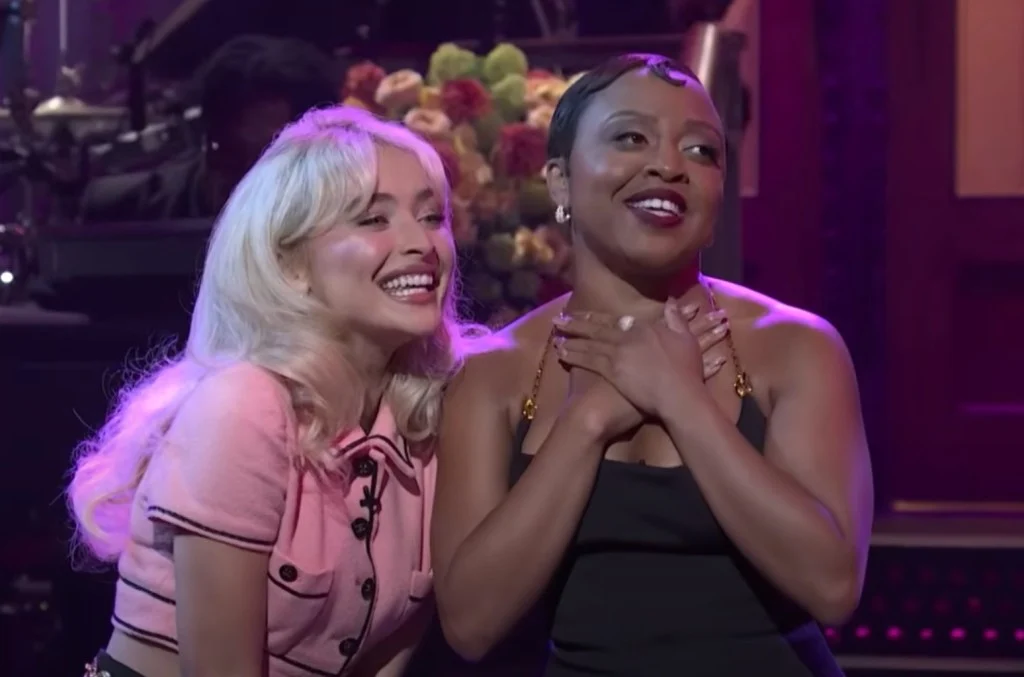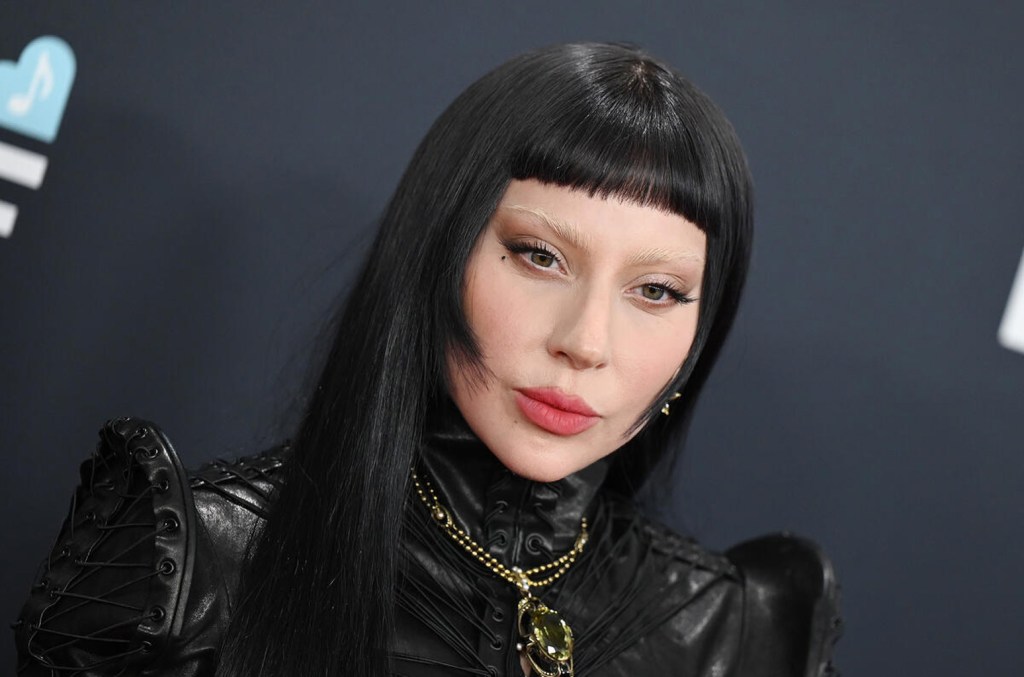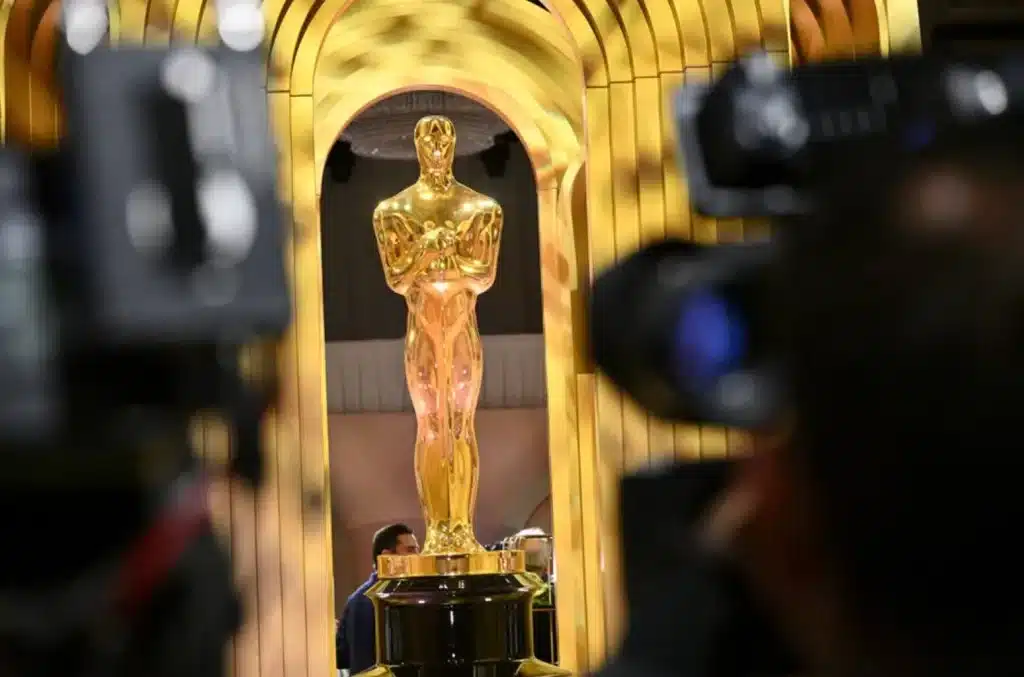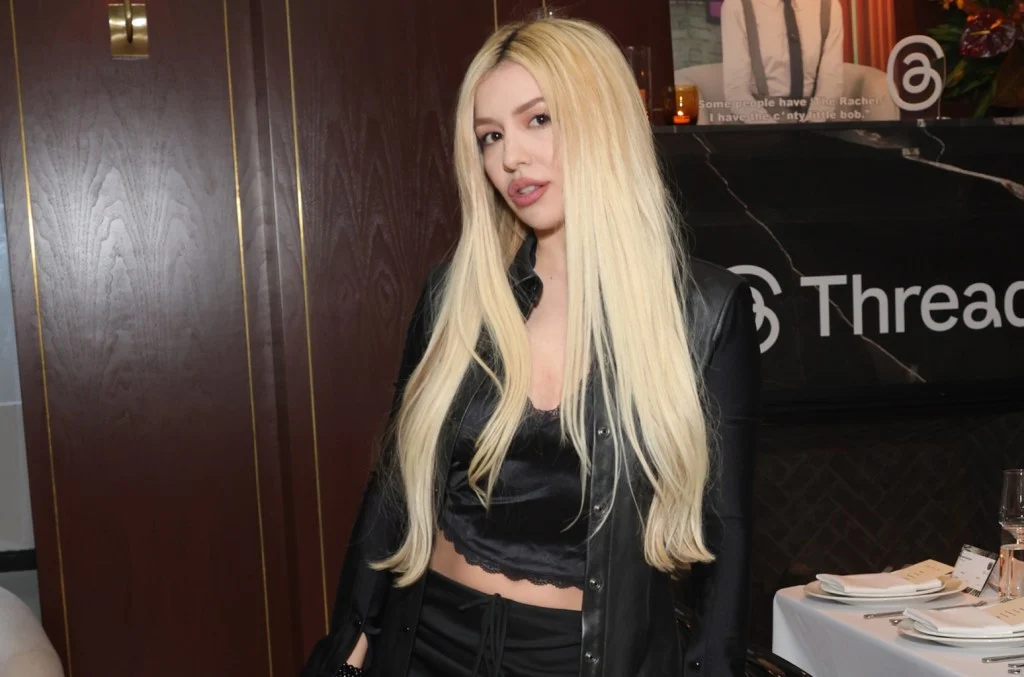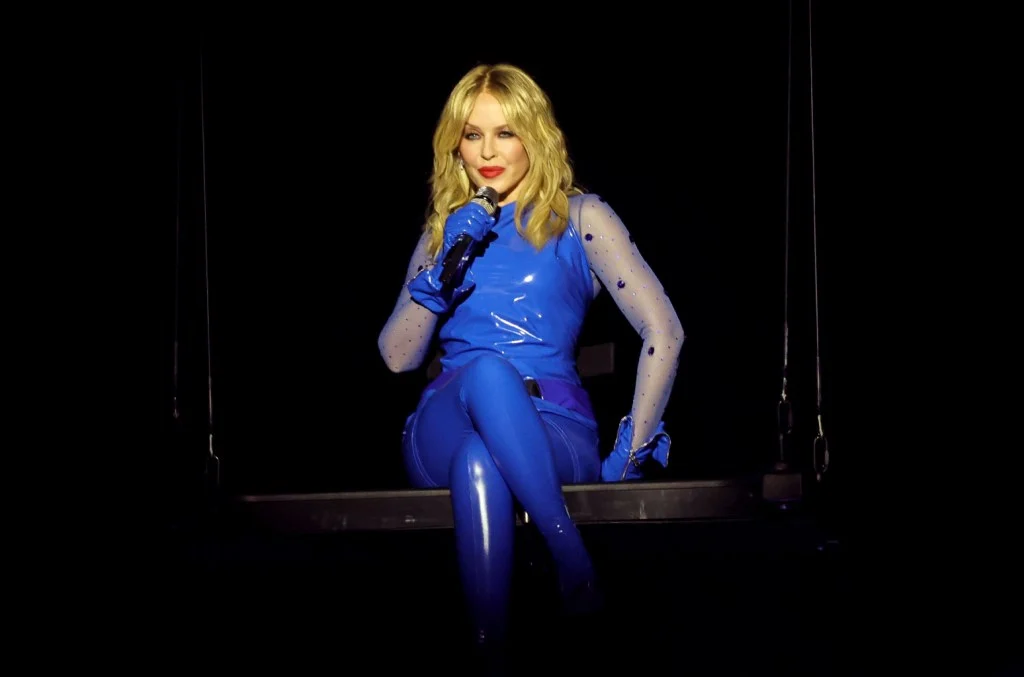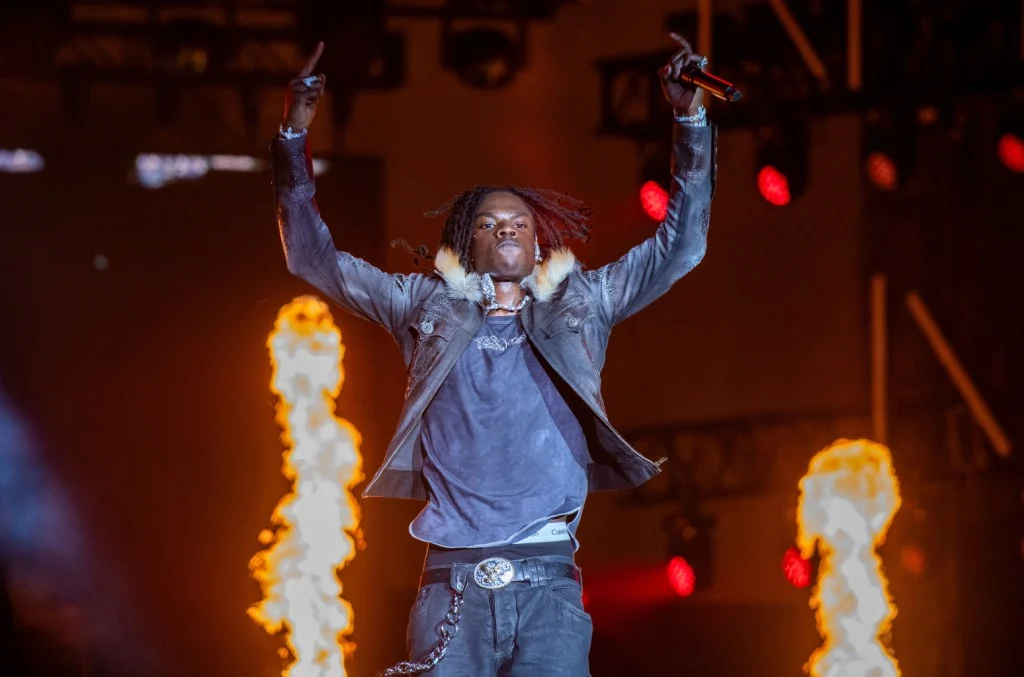Music
Page: 300
Sabrina Carpenter and Quinta Brunson teamed up for a catchy musical tribute to short people during Saturday Night Live on May 3.
In her opening monologue, the Abbott Elementary creator and star joked about her height before the “Please Please Please” singer joined her for a playful performance celebrating “shorties” everywhere.
Brunson, hosting SNL for the second time, noted that she was “proof you can do anything you put your mind to even if people look down on you.” She continued, “Whether it’s because of where you come from or literally because you’re only 4’11′ — yeah, that’s right, I’m short … But I love being short, and I want other short people to know the sky’s the limit. So shorties, tonight, this one’s for us!”
Brunson then launched into a humorous song about her stature, noting that she’s a cheap date who gets “wasted off of one glass of wine,” and name-checked other famously petite celebrities including Simone Biles, Kendrick Lamar and Tom Holland.
Carpenter — who’s around five feet tall herself — soon joined Brunson on stage, exchanging jokes with the host about eating short ribs and reading short stories. The performance culminated in a group number joined by SNL cast member Marcello Hernandez (5’6″) and former NBA star Dwyane Wade (6’4″).
Trending on Billboard
“It’s how we like our movies, and how we like our margins,” they all sang together. “We’ve been the same height since kindergarten. Life is just more fun when you’re fun size.”
Elsewhere in the episode, pop star Benson Boone made his SNL debut, performing two tracks — “Sorry I’m Here for Someone Else” and “Mystical Magical” — from his upcoming sophomore album, American Heart. The new project is scheduled for release on June 20 through Night Street Records/Warner Records. Watch Boone’s SNL performances here.
Check out Brunson’s SNL monologue below. For those without cable, the broadcast streams on Peacock, which you can sign up for at the link here. Having a Peacock account also gives fans access to previous SNL episodes.
Police in Brazil said on Sunday (May 4) that two people have been arrested in connection with an alleged plot to detonate explosives at a free Lady Gaga concert in Rio de Janeiro.
The Rio event on Saturday (May 3) was the biggest show of the pop star’s career that attracted more than 2 million fans to Copacabana Beach and had crowds screaming and dancing along.
Even as Brazilian authorities said they arrested suspects in the hours before Gaga’s show, the event went ahead without disruption — leading some to question the seriousness of the threat. Serious security concerns typically lead organizers to cancel such massive events — as happened with Taylor Swift’s concerts in Vienna last year.
Trending on Billboard
Police said said nothing about the alleged plot at the time to in an effort to “avoid panic” and “the distortion of information.”
On Sunday, a spokesperson for Gaga said the pop star and her team “learned about this alleged threat via media reports this morning. Prior to and during the show, there were no known safety concerns, nor any communication from the police or authorities to Lady Gaga regarding any potential risks.”
The statement added: “Her team worked closely with law enforcement throughout the planning and execution of the concert and all parties were confident in the safety measures in place.”
Security was tight at Saturday’s concert, with 5,200 military and police officers deployed to the beach where fans were reveling in the pop singer’s classic hits like “Born This Way,” which became something of an LGBTQ anthem after its 2011 release.
Rio de Janeiro’s state police and Brazil’s Justice Ministry presented the bare outlines of a plot that they said involved a group that promoted hate speech against the LGBTQ+ community, among others, and had planned to detonate homemade explosive devices at the event.
“The plan was treated as a ‘collective challenge’ with the aim of gaining notoriety on social media,” the police said. The group, it added, disseminated violent content to teenagers online as “a form of belonging.”
Authorities arrested two people in connection with the alleged plot — a man described as the group’s leader in the southern state of Rio Grande do Sul on illegal weapons possession charges, and a teenager in Rio on child pornography charges. Police did not elaborate on their exact roles in the plot or on how the group came to target Gaga’s free concert.
“Those involved were recruiting participants, including teenagers, to carry out integrated attacks using improvised explosives and Molotov cocktails,” police said.
The Justice Ministry said that it determined the group posed a “risk to public order.” It said the group falsely presented themselves online as “Little Monsters” — Gaga’s nickname for her fans — in order to reach teenagers and lure them into “networks with violent and self-destructive content.”
The ministry said there was no impact on those attending the open-air concert.
During a series of raids on the homes of 15 suspects across several Brazilian states, authorities confiscated phones and other electronic devices. Although police said they believed homemade bombs were intended for use in the planned attack, there was no mention of the raids turning up any weapons or explosive material.
Gaga has expressed gratitude for the enormous crowd in an Instagram post that said nothing of the alleged plot.
“Nothing could prepare me for the feeling I had during last night’s show—the absolute pride and joy I felt singing for the people of Brazil,” she wrote. “The sight of the crowd during my opening songs took my breath away. Your heart shines so bright, your culture is so vibrant and special, I hope you know how grateful I am to have shared this historical moment with you.”
Her free beach concert stood out at a time of surging ticket prices for live music around the world as concert-goers pay budget-busting costs to see their favorite artists.
Rio has done this before — last May, superstar Madonna performed the finale to her latest world tower for some 1.6 million fans on the sprawling sands of Copacabana Beach.
Benson Boone brought his dynamic stage presence and first-class showmanship to Saturday Night Live on May 3.
Making his debut as the musical guest on the long-running NBC sketch comedy series, the 22-year-old pop sensation performed two tracks from his forthcoming sophomore album, American Heart.
Following an introduction from SNL host Quinta Brunson, Boone nailed one of his electrifying signature backflips before briefly serenading the actress and comedian with his song “Sorry I’m Here for Someone Else,” which peaked at No. 34 on the Billboard Hot 100 earlier this year.
Explore
Explore
See latest videos, charts and news
See latest videos, charts and news
Later in the episode, the 2025 best new artist Grammy nominee returned to the stage for a performance of “Mystical Magical.” Dressed in a velvety purple ensemble, Boone delivered the jangly pop-rock track amid a dreamy backdrop of glowing pink and blue lights, supported by a full band and backup singers dressed in white.
“‘Cause it feels so mystical, magical, oh baby/ ‘Cause once you know, once you know/ My love is so mystical, magical, oh baby/ ‘Cause once you know, once you know,” he sings on the song, which interpolates “Physical,” an Olivia Newton-John classic, in the chorus.
Trending on Billboard
Boone’s SNL debut arrives ahead of the release of American Heart, scheduled for release on June 20 through Night Street Records/Warner Records. Both “Sorry I’m Here for Someone Else” and “Mystical Magical” appear on the forthcoming project.
His appearance at Studio 8H follows a standout run at Coachella in April, where he wowed audiences with high-energy sets packed with backflips — and even a surprise cameo from Queen guitarist Brian May during a cover of “Bohemian Rhapsody” on weekend one.
Watch Boone’s SNL performances below. For those without cable, the broadcast streams on Peacock, which you can sign up for at the link here. Having a Peacock account also gives fans access to previous SNL episodes.
Lady Gaga performed to a record-breaking crowd during her free concert at Copacabana Beach in Rio de Janeiro, Brazil, on Saturday (May 3).
“Tonight, we’re making history,” she told the massive audience. “Thank you for making history with me.”
The concert began around 10 p.m. local time, with the 39-year-old pop icon opening with her 2011 track “Bloody Mary.” She followed it with a hit-filled set including fan favorites like “Poker Face” and “Alejandro,” as well as music from her latest Billboard 200-topping album, Mayhem.
Concert organizers estimated that approximately 2.1 million people attended the free Copacabana Beach show, according to Associated Press. The event is now the highest-attended concert by a female artist in history, surpassing Madonna’s 2024 performance at the same venue, which drew 1.6 million.
The largest concert crowd in history is still held by Rod Stewart, who drew 3.5 million fans to a New Year’s Eve performance at Copacabana Beach in 1994, according to the Guinness World Records.
Gaga’s performance drew over 1 million Brazilians and approximately 500,000 Little Monsters who flew in for the show, generating more than $100,000 for Rio’s economy, NPR reports. The city’s tourism department has announced that free concerts will continue to be held at Copacabana Beach at least through 2028.
Trending on Billboard
The Rio concert marked Gaga’s first performance in Brazil since 2012.
“I’ve missed you so much,” the superstar told the crowd during a soundcheck the night before the show, according to Rolling Stone. “I know that this is not the first show here, I know this is just a rehearsal, it feels like it’s the real show.”
In 2017, Gaga canceled her Rock in Rio performance due to “severe physical pain,” later revealing she had been hospitalized at the time.
The Oscars made the announcement on Monday, March 17: Comedian Conan O’Brien, who had earned top marks for hosting the 2025 Oscars, would be returning as host of the 2026 Oscars on Sunday, March 15, 2026.
Most of us focused on the host announcement, which was made far earlier in the year than is typical, but Murphy Reinschreiber, COO of the McCourt Foundation, which operates the L.A. Marathon, immediately zeroed in the date, which was the same as the already-announced date of the 2026 L.A. Marathon, which is typically held on the third Sunday in March.
The McCourt Foundation had announced its 2026 marathon date on March 15, one day before the 2025 marathon and two days before the Oscars made their announcement.
Trending on Billboard
Reinschreiber was driving home after finishing work on this year’s marathon when he learned of the double booking.
“It was confusing and the other thought that went to my mind is there are just no days off in this business,” he told The Los Angeles Times. “It’s one thing after the other.”
It would be virtually impossible to have both megaevents on the same date. The Oscars is held at the Dolby Theatre on Hollywood Blvd., which is right along the marathon route. Both events require significant road closures and law enforcement deployment.
After six weeks of uncertainty, a solution was finally reached on Thursday (May 1): The 98th Oscars will be held as originally scheduled. The McCourt Foundation will announce a new March date for the race in the coming days.
Both parties also agreed that, to avoid future date conflicts, the L.A. Marathon will take place on the third Sunday in March (on which it has often but not always been held in recent years), and the Oscars will steer clear of that date. (Though the Oscars are often right around this date, this was the first time the Oscars landed on the third Sunday in March since 1999.)
Moving a marathon is no easy feat. The event spans a large chunk of the city and involves more than 25,000 runners, thousands of volunteers, medical personnel, law enforcement and city workers.
“The number of people, communities and businesses that are all impacted by a change of date is mind-boggling,” Reinschreiber told the L.A. Times. “We are going to have to undergo a significant community awareness program.”
More than 5,000 people have registered for the 2026 Marathon, and they will need to be offered the option of a refund due to the change in date, he said.
Who in city government wasn’t on top of things and allowed two megaevents to be scheduled for the same date? No one is saying.
With this conflict resolved, it’s official: The 2026 Oscars will air live on ABC on Sunday, March 15 at 7 p.m. ET/4 p.m. PT. It’s the third year in a row that the telecast will start at 4 p.m. on the West Coast — in an effort to make it so that East Coast viewers can find out who wins the biggest awards before they go to bed. (This year’s show ended at 10:50 p.m. ET, making that goal a reality for all but the earliest risers.)
The show will again be held at the Dolby Theatre at Ovation Theater in Hollywood, its home base for every year but one since 2002. (The best-forgotten 2021 pandemic show was held at the Union Station in downtown L.A.)
Raj Kapoor and Katy Mullan will return as the show’s executive producers for the third consecutive year. They first served in that capacity in 2024, when Kimmel hosted. They each won Primetime Emmys for outstanding variety special (live) for that show. Kapoor had previously won for outstanding variety special (pre-recorded) for his work on Adele: One Night Only.
Jeff Ross and Mike Sweeney will return as producers for a second time. Sweeney will also serve as a writer. Sweeney has won three Primetime Emmys for previous productions with O’Brien. Ross has won one.
Ava Max‘s new album Don’t Click Play is arriving this summer. The set, featuring lead single “Lost Your Faith,” will be her third full-length album. Max unveiled the album’s release date and its cover art on Thursday (May 1). Pop fans will be able to click play on Don’t Click Play on Aug. 22. The […]

Although the ceremony for the 2025 ACM Awards is still a few days away, Ella Langley and Riley Green are early winners for their breakthrough hit “You Look Like You Love Me.” The surprise was revealed while the pair were on stage at Country Thunder in Tampa, Florida, Friday night (May 2) — with the reveal coming from none other than country icon and 18-time ACM Awards host Reba McEntire.
A special video from Reba, in which she congratulated the two artists as winners of this year’s award for visual media of the year (for their “You Look Like You Love Me” music video), played during Green’s set at the festival on Friday. Langley receives honors for both artist and director in the category.
Trending on Billboard
“Sorry to interrupt, but I have some big news,” Reba teased in the clip that announced their win. “Congratulations to Ella and Riley! Can’t wait to celebrate with you both in Frisco!”
Langley learned of her first Academy of Country Music award just a week ago, during her set at Rock the Country in Knoxville, Tennessee.
News of that first win — for new female artist of the year — arrived courtesy of friend and co-writer Miranda Lambert via video message. (Lambert, who called Langley “my soul sister in country music and a partner in crime,” was named winner in the same category 18 years ago.)
Langley’s the most-nominated artist at the 60th ACM Awards.
With two awards to her name already, several remain up for grabs for the singer-songwriter at this year’s ceremony: female artist of the year, plus single of the year, song of the year and music event of the year (all for her “You Look Like You Love Me” duet with Green). For song of the year, the two are nominated as both artists and songwriters.
The twangy, flirty barroom duet, released in 2024, made it to No. 1 on Billboard’s Country Airplay chart, No. 7 on Hot Country Songs and No. 30 on the Billboard Hot 100.
The 2025 ACM Awards will stream live globally on Prime Video and the Amazon Music channel on Twitch on Thursday, May 8 at 8 p.m. ET / 7 p.m. CT / 5 p.m. PT from the Ford Center at The Star in Frisco, Texas. Expect to tune in for two-and-a-half hours to catch the full show.
The Academy of Country Music Awards is the longest-running country music awards show, with its inaugural year being 1966.
The ACM Awards are produced by Dick Clark Productions, which is owned by Penske Media Eldridge, a joint venture between Eldridge Industries and Billboard parent company Penske Media.
Pop superstar Kylie Minogue capped her first arena tour of the United States and Canada on Friday night (May 2) as her Tension Tour touched down in Los Angeles at Crypto.com Arena.
“Good evening, Los Angeles! We are here!” the ever-gracious performer exclaimed to the packed house early in the evening. “Thank you so much each and every one of you for coming out tonight, and welcome to the Tension Tour.”
While the two-hour show took fans on a journey through four decades of Minogue’s hits, it also highlighted eight songs from her two most recent studio albums, Tension II (released in 2024) and Tension (2023). Among those choice cuts were Tension’s Grammy Award-winning “Padam Padam,” which was also a top 10-charting hit on Billboard’s Hot Dance/Electronic Songs chart in 2023, and the show-opening “Lights, Camera, Action” from Tension II.
Trending on Billboard
The Tension Tour is just the third traveling show Minogue has brought to the U.S. and Canada, having previously visited the country with Aphrodite Live in 2011 and the KYLIE trek 2009, with both staged before more intimate crowds as compared to the arena-sized audiences of the Tension Tour. Separate from her three tours, Minogue also mounted her first Las Vegas residency in 2023-24, with 20 dates at the 1,000-seat capacity Voltaire at The Venetian Las Vegas.
The Tension Tour kicked off on Feb. 15 in Perth, in Minogue’s home country of Australia, moved to Asia for a trio of dates (March 10-15) and then reached North America on March 29 in Canada. For the U.S. and Canada run, the Tension Tour played 16 shows between March 29-May 2, including a pair of nights at New York’s Madison Square Garden (April 4-5). The trek now moves to Europe on May 16, then to South America on Aug. 7, and then back to North America for its three final dates in Mexico (Aug. 22-26). By the close of the Tension Tour, Minogue will have played nearly 70 shows in more than 25 countries on five continents.
At one point during the Los Angeles show on Friday, Minogue paused and reflected, “Here we are in 2025 and I get to be on a world tour with these beautiful humans, beautiful intelligent humans — the ones you can see on the stage and off stage. And I get very emotional thinking about this, this… that I’ve… it’s been a lifetime and sometimes it just amazes me. So very, very grateful. Thank you so much for being here.”
That “lifetime” of a musical career was on display through the show, with Minogue offering up a bevy of hits like her first single, the 1987 cover of “The Loco-Motion,” along with “Better the Devil You Know” (1990), “Spinning Around” (2000, and joined onstage by the show’s opening act Rita Ora), “Can’t Get You Out of My Head” (2001), “All the Lovers” (2010) and many more.
Before the final song of the night (“Love at First Sight”), a joyful Minogue shared a message with the crowd: “You’ve been beyond tonight. You’ve been here, present, ready, going — thank you so much for being here, for your beautiful energy, for being here for me in all different times of my career. For being there for each other! I just want to give a real shout-out to our entire crew because this has been an incredible run. We’ve loved it, so thank you.” After a moment of applause from the crowd, she then humorously added, “I’ve got some old friends here tonight. Look at me now!”
Rema‘s 2022 debut album, Rave & Roses, spun out the biggest Afrobeats crossover hit in U.S. history (the Selena Gomez-assisted “Calm Down”), and just three years later, the Nigerian superstar has cemented his place in the genre’s Big Four with a fiery, high-octane Madison Square Garden debut in New York City on Friday (May 2).
Named for Heis — his 2024 sophomore LP, which earned him his first Grammy nod for best global music album — Rema’s Heis World Tour is a towering statement of what an impressive career and catalog the 25-year-old visionary has built for himself since exploding onto the scene with 2019’s “Dumebi.” While that early-career hit was saved for later in the night during Friday’s concert, Rema, dressed in a massive fur overcoat and wielding a machete atop a levitating platform, kicked off his headlining set with “March Am,” Heis’ introductory track.
“I wanna introduce to you a man, a myth, a legend,” a faceless announcer declared over brooding, cinematic drums reminiscent of the ones that define the soundscape of Heis. “He goes by many names! He is… Prince of Afrobeats, Rema!” This lead-in may have felt a bit overblown for other artists, but Rema spent the next hour-and-a-half proving why he’s worthy of such an effusive intro. Fellow Heis cuts “Azaman” and “Yayo” followed, keeping the crowd’s energy consistent for the show’s first act before the first of several interludes that chopped up the setlist’s flow.
The concert’s setlist was loosely organized by theme and tempo. What it lacked in continuity, Rema more than made up for with the sheer number of hits he played. A cheeky kiss-cam introduced a mellower, heart-eyed segment featuring cuts like “Favorite Girl” (with Darkoo) and “Soundgasm”; “Calm Down” made for a classic arena sing-along moment, and newer drops like “Bout U” and “Baby (Is It a Crime)” allowed Rema the space to show off both his sultrier R&B side and his swaggering rock edge.
Though his stage was equipped with a sizeable walkway, Rema performed the bulk of his set’s most intense moments atop what appeared to be an entrance to some sort of dungeon. That blocking worked for the show’s overall aesthetic, but it likely would have made for an even more thrilling performance if he hit the night’s most energetic moments closer to the crowd. Nonetheless, from a recreation of the “Charm” music video to the smart additional harmonies sung by his female background singers, the raucous energy of Heis found subtle complements in the pockets of feminine energy that decorated the show.
From surprise guests to eyebrow-raising statements, here are the five best moments from Rema’s Heis Tour stop at New York City’s Madison Square Garden.
A Surprise Birthday Celebration
Fat Joe is mourning the loss of his mother.
On Saturday (May 3), the 54-year-old hip-hop icon shared a heartfelt tribute on social media honoring his mom, Marie Del-Carmen Cartagena, who passed away at the age of 77.
“This a real one, rest in peace to the woman who brought me in this world,” Joe wrote on Instagram alongside a slideshow of family photos. “She didnt have much but she gave us everything.
In the emotional post, the Bronx-born rapper reflected on his mother’s deep love for her family and unwavering commitment to her community.
“Anyone who knows my Mom knows she had a heart of gold, she refused to move out the projects for many years even though i had money,” he wrote. “She loved her community, she loved her people,Ms Ruby the Terror Squad Queen. she was sooooooo proud of us meaning everyone in the crew.”
Joe also shared that his mother died of a “broken heart” following the recent death of his father, Ernesto Delgado, who passed away earlier this year at age 89. The couple had been married for 60 years.
“I tried everything humanly possible,” he continued. “She was happy, to the Castro family, the Cartagena family, the Delgado family i love you and thank you for the outpouring of love.”
Joe concluded the tribute with a touching message to his late mother. “Mommy till i see you again you were my world, my heart, my everything. I’ll continue to make you proud,” he wrote.
The hip-hop community quickly rallied around Fat Joe, offering words of comfort and support in the comments.
“Rest peacefully Beautiful Queen,” Busta Rhymes commented in the post. Questlove added, “Condolences Joe,” along with a prayer hands emoji. And Ja Rule echoed the sentiment, commenting with prayer hands and dove emojis.
See Fat Joe’s full tribute to his mother on Instagram here.

 State Champ Radio
State Champ Radio 